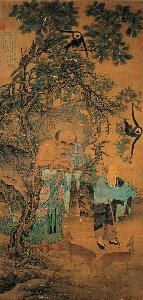Liu Sung-Nien
Liu Sung-Nien;Liu Songnian
สถานที่: Unknown
เกิด: 1174
ความตาย: 1224
ชีวประวัติ:
Liu Songnian, also known as Liu Sung-Nien, was a prominent Chinese landscape painter during the early Southern Song Dynasty (1127–1279). He was active from about 1190-1230 and is considered one of the Four Masters of the Southern Song dynasty, along with Li Tang, Ma Yuan, and Xia Gui. Born in 1174, Liu studied and worked at the Imperial Academy of Painting in Hangzhou, capital of the Southern Song dynasty.
Early Life and Career
Liu entered the Southern Song Imperial Academy of Painting as a student in 1189 and went on to become a painter-in-attendance from 1190 to 1194. During the reign of Emperor Ningzong of Song, he received a prestigious award for his work. Liu followed the tradition of Li Tang, and his style influenced the work of Ma Yuan and Xia Gui. His paintings are characterized by simple yet expressive brushstrokes, and his use of monochromatic ink.
Artistic Style and Influences
Liu's artistic style was influenced by the tradition of Chinese literati painting, which emphasized individual expression and personal interpretation over technical skill. He was also influenced by the work of Sakaki Hyakusen, a prominent Nanga artist, and Gion Nankai, another notable Nanga artist. His paintings often featured landscapes, figures, and poetry, and were known for their delicate brushwork and subtle color schemes.
- Some of his notable works include Bamboo and Rock in Snow, which exemplifies the Nanga style with its emphasis on simple yet expressive brushstrokes and its use of monochromatic ink.
- Another notable work is Window onto Bamboo on a Rainy Day, which showcases the movement's focus on nature and its use of empty space to convey a sense of tranquility.
- Liu's painting Ink Landscape is a prime example of this fusion of art and literature, reflecting his understanding of Chinese poetry and philosophy.
Legacy and Impact
Liu Sung-Nien's legacy can be seen in the works of modern Japanese artists who continue to draw inspiration from this rich artistic tradition. His influence can also be seen in the Museu Nacional de Belas Artes in Rio de Janeiro, Brazil, which houses a significant collection of Nanga paintings, including works by Sakaki Hyakusen and Gion Nankai. The Freer Gallery of Art in Washington D.C. also has a notable collection of Nanga paintings, including works by Liu Sung-Nien and other prominent artists. Important to note that Liu's work has been recognized as an important part of Chinese art history, and his influence can be seen in many modern Chinese artists and styles. The Imperial Academy of Painting where he studied and worked is now a museum, showcasing some of his notable works, including Bamboo and Rock in Snow and Window onto Bamboo on a Rainy Day. https://Wikioo.org/@/Liu-Sung-Nien https://en.wikipedia.org/wiki/Liu_Songnian https://Wikioo.org/Art.nsf/O/A@D3CQCX https://Wikioo.org/Art.nsf/O/D2U3QK


